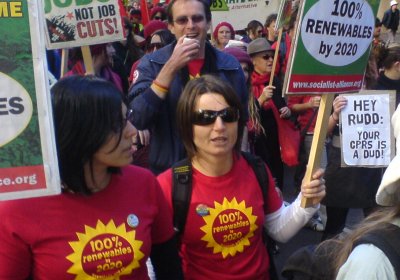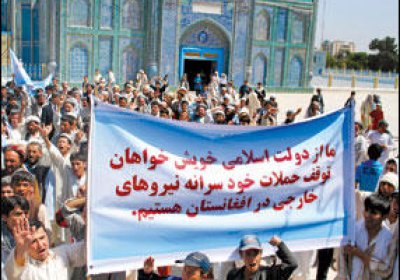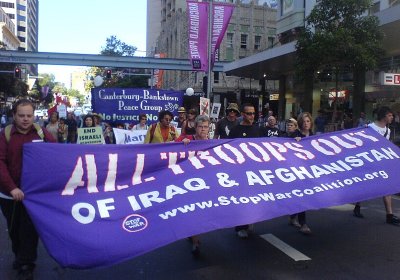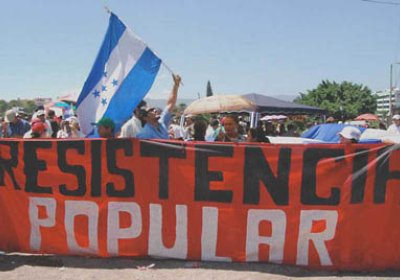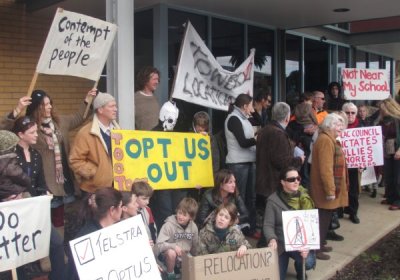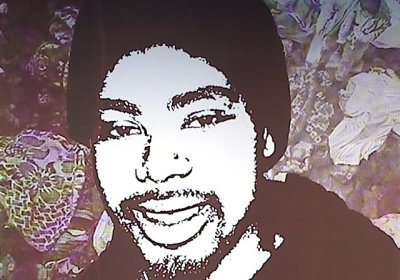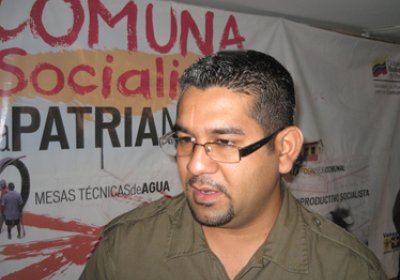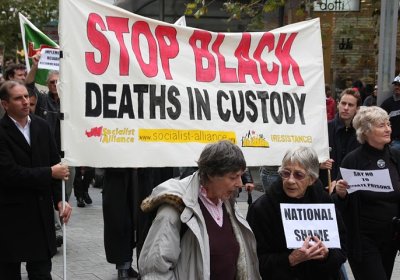PM Julia Gillard was supposed to launch Labor's new policy to tackle climate change on July 23. But in essence she merely restated the same old Labor climate policy: delay, delay and delay again.
Gillard's speech was pages long, but her climate agenda can be summarised in just four words — more talk, less action.
The core promise was that her government would create a "citizens assembly" to discuss options to deal with global warming. Perhaps the government will propose the ice caps and glaciers hold off from melting until Gillard's august assembly has concluded its deliberations.
845
Citizens rallied in two Afghan cities on July 10 and 11, chanting slogans against the occupying powers and the unpopular regime of President Hamid Karzai for failing to protect civilians.
On July 10, hundreds took to the streets of Mazar-i-Sharif to demand that all occupation forces leave.
The protest was organised after an artillery barrage from occupying NATO forces killed six civilians in Paktia province on July 8 and US troops killed two civilians in a pre-dawn raid in the city on July 7.
Protesters chanted slogans against occupation forces and Karzai.
Australian Prime Minister Julia Gillard’s high-handed attempts to impose a “regional asylum seeker processing centre” on East Timor have angered Timorese politicians and activists.
Despite Gillard’s talk about finding a regional solution to a regional problem, the “problem” of “unauthorised boat arrivals” in Australia is one of perception.
The Liberal-National opposition and the Murdoch tabloids have devoted considerable energy to creating anxiety in sections of the Australian community about the country being swamped by “boat people”.
Defence minister Senator John Faulkner has joined the list of cabinet members who, since Julia Gillard became prime minister, have said they will resign from the front bench after the upcoming elections.
He dismissed suggestions that this was because he had doubts about the unpopular war in Afghanistan, which he has the task of promoting.
Anti-war activists took to the streets on July 15 outside Labor MP Tanya Plibersek's office to collect support for a giant “troops out” petition that will be presented to the new pro-war PM Julia Gillard.
With a federal election looming, and at least 61% of Australians opposed to Australia having troops in Afghanistan, Stop the War Coalition is organising to increase the pressure for a withdrawal.
The people of Honduras are continuing their struggle for democracy more than one year after the June 28 military coup that overthrew elected President Manuel Zelaya.
The dictatorship tried to legitimise itself with fraudulent elections that brought President Profiro Lobo Sosa to power. The United States government, which was complicit in the coup, recognised the results despite almost no other government doing so. The US has since fully restored military assistance.
On July 17, unionists and residents from Forrest, a small town in the Victorian Otways region, converged on the shire office at Colac to protest against an Optus communications tower being placed in the middle of their town.
The community picket line was established on the site for the new tower two weeks earlier. The community sought support from the construction unions, which it has received from the Construction Forestry Mining Energy Union and the Electrical Trade Union.
A jury voted on July 8 to convict a transit police officer who killed an unarmed 22-year-old African American man, Oscar Grant III, on an Oakland station platform 18 months ago. But the officer was convicted of the least serious possible manslaughter charge.
The verdict left Grant’s family and their supporters — and the community that Grant called home — bitter and angry.
Wilder Marcano is a director of the network of communes in Caracas. The communes are part of the push, supported by President Hugo Chavez, to deepen popular power and create a new, revolutionary state. Venezuelanalysis.com said on February 8 there are 184 communes “in construction” across the country.
Five hundred people rallied outside the Perth Supreme Court Gardens on July 11 to demand that the coronial investigation into Mr Ward's tragic death be reopened.
Mr Ward, a respected Aboriginal elder, was literally cooked to death in the back of a prisoner van while being driven from Laverton to Kalgoorlie to face court for a traffic offence in January 2008.
The coroner found that temperatures inside the van reached 47° Celsius and that metal surfaces in the van would have reached 56°C.
Work at all P&O Automotive and General Stevedoring (POAGS) wharves shut down nationwide in all 15 ports for 24 hours at midday on July 14 after the death of another waterside worker. It was the third this year, the second at POAGS operations and the third fatality at Appleton Dock in seven years.
A 41-year-old Melbourne waterside worker, Stephen Piper, was crushed to death that morning at Appleton Dock.
On July 6, while 32-year-old Mustansar Rindhawa was listening to a worker who had not been paid his wages by a textile boss, an unknown person with a Kalashnikov entered the front room and fired.
Mustansar tried to save his life by running to the next room, but 10 people were determined to finish him off.
I met Mustansar briefly on June 19 in Faisalabad, less than a month before his murder. He was one of 30 participants in a trade union training course at the Labour Qaumi Movement (LQM) offices.
- Page 1
- Next page
